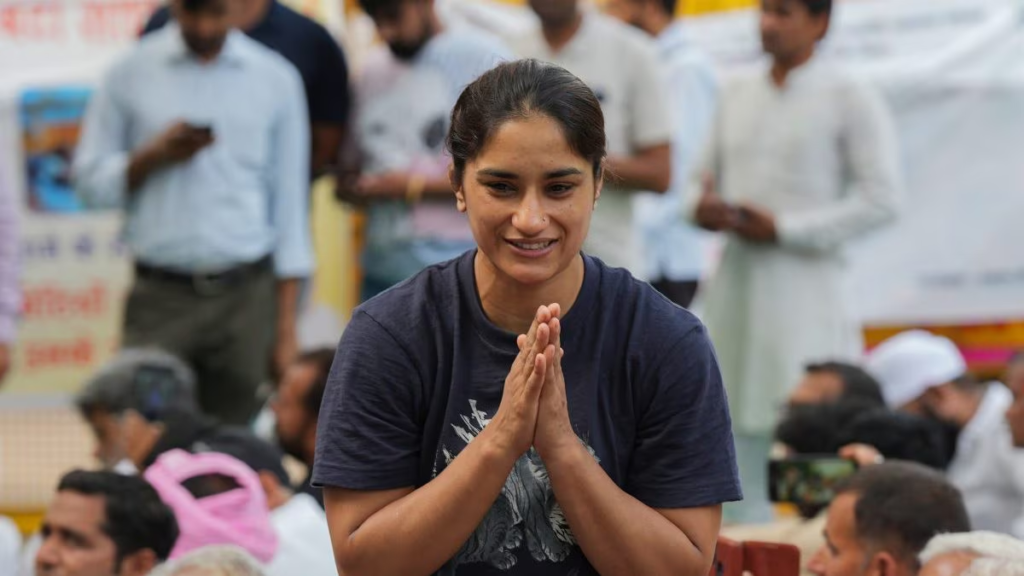
Vinesh Phogat, India’s decorated wrestler, recently ignited a firestorm of debate by competing in two weight categories (50kg and 53kg) at the Indian Wrestling Trials for the Asian Olympic Qualifiers. While Phogat emerged victorious in both categories, the move sparked questions about fairness and adherence to wrestling regulations.
Fair Play or Unfair Advantage?
Arguments for Vinesh Phogat:
- Versatility and Strategic Advantage: Supporters argue that Phogat’s ability to compete in two categories showcases her versatility as a wrestler. They see it as a strategic move, allowing her to choose the weight class that best suits her performance at the Olympics.
- Addressing Injuries: Some suggest that Phogat might be aiming to compete in the 53kg category at the Olympics due to lingering injuries in the 50kg category. Competing in both trials could be a way to assess her fitness and identify the most suitable weight class.
- Lack of Clear Rules: There appear to be no explicit rules within the Indian Wrestling Federation (WFI) prohibiting athletes from competing in multiple weight categories during selection trials.
Arguments Against Vinesh Phogat:
- Denial of Opportunity: Critics argue that Phogat’s participation in both categories disadvantaged other wrestlers, particularly those specifically training for the 53kg category. It potentially denied a deserving athlete a chance to represent India at the qualifiers.
- Unrealistic Olympic Goal: Some question the feasibility of competing in two weight classes at the Olympics itself. The rigorous training and weight management required for each category makes it a physically demanding and potentially risky proposition.
- Ethical Concerns: Critics highlight the ethical implications of a star athlete potentially manipulating the selection process. They argue that it sets a precedent that could discourage fair competition in future trials.
Reactions from the Wrestling Community: A Mixed Bag
Reactions from fellow wrestlers were mixed. Some, like Anshu Malik (57kg category), expressed their disappointment, stating they had trained specifically for their weight class. Others, like Pooja (76kg category), acknowledged Phogat’s talent and her right to choose what she felt was best for her career.
The WFI, while not explicitly endorsing Phogat’s actions, ultimately allowed her participation and upheld the results. This lack of a clear stance further fueled the debate.
Media Frenzy: Highlighting the Issue or Creating a Spectacle?
The media extensively covered the controversy, with headlines often sensationalizing the situation. While it brought the issue to light and sparked public discussion, some felt the media’s focus on a potential rule violation overshadowed Phogat’s athletic achievements.
Open and transparent communication from the WFI regarding their stance on multi-category participation in trials could have helped navigate the situation more constructively.
Beyond the Controversy: A Call for Clearer Guidelines
The Vinesh Phogat controversy exposes a lacuna in the selection process. Moving forward, the WFI should establish clear and unambiguous guidelines regarding athlete participation in multiple weight categories during selection trials.
This will ensure fairness for all wrestlers, eliminate potential ethical concerns, and prevent similar controversies from erupting in the future.
A Complex Issue with No Easy Answers
The issue of Vinesh Phogat’s dual participation is multifaceted. While arguments can be made on both sides, establishing clear guidelines within the WFI framework is crucial.
Ultimately, fostering a fair and transparent environment for athlete selection will benefit the sport and ensure that India’s best wrestlers have a clear path to represent the nation on the global stage.
Whether Vinesh Phogat’s decision was a strategic gamble or a genuine attempt to assess her fitness remains unclear. However, one thing is certain: this controversy has sparked a much-needed conversation about fair play and the need for clear regulations within Indian wrestling.
